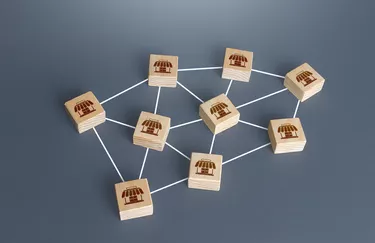
A franchise business owner operates a business under the umbrella of a larger brand. The franchisee uses the name, logo, services, products and any other assets of the franchisor to run the business. McDonald's and Dunkin' are examples of franchisors.
Franchise Business Model
Video of the Day
The franchise system works by allowing a potential small business owner to have the security of a larger, well-established business. Franchising works by enabling the business owner, or franchisee, to ride the coattails of the franchisor's brand.
Video of the Day
The franchisee pays the franchisor a franchise fee plus royalties for using the franchisor's brand. The franchisor also provides ongoing support like training, marketing, advertising and much more to help the franchisee's small business.
This is an excellent way for entrepreneurs to open a small business without starting from scratch.
Franchise Business Start-Up Costs
When you apply to be a franchisee, there is an initial fee. This franchise fee can be in the thousands and is non-refundable. McDonald's franchise fee is $45,000. There are also other start-up costs. Many franchisors require a minimum dollar amount of liquid assets before entering into a franchise agreement.
Besides the fees to the franchisor, you will need to build or rent and equip the business. In addition, inventory will need to be purchased. Besides these essentials, you'll need to pay for operating licenses and insurance.
The franchisor may also charge a "grand opening" fee to promote your new outlet. Other advertising fees will also be required.
A franchisee is required to pay royalty fees to the franchisor. The royalty fees are based on sales.
Franchising works by enabling the business owner, or franchisee, to ride the coattails of the franchisor's brand.
Franchise Site Selection
Often, a franchisor will do site studies to determine if a proposed franchise location is feasible for their brand. The franchisor retains the right to approve or disapprove the site that the franchisee has selected. You'll want to wait before buying any real estate until you have the franchisor's permission.
Franchise Disclosure Document
A franchisor is required by the Federal Trade Commission (FTC) to provide a potential franchisee with a Franchise Disclosure Document (FDD). This must be provided at least 14 days before you are asked to pay a franchise fee or sign a franchise agreement or franchise contract.
The FDD outlines the responsibilities of the franchisor and the franchisee. This document lets you know:
- The financial stability of the franchisor
- Potential earnings
- Franchisor's background
- What suppliers you can use
- Litigation history
- Initial and ongoing costs
- All aspects of the franchise relationship
It is separate from the operations manual, which lets you know how the franchise should be run.
The FDD should also make you aware of different franchise industry trade associations, like the International Franchise Association.
Franchise Opportunities
Choosing the right franchise is imperative. Investigate any franchisor you're considering. Check to see if there is demand for their product and brand. Do they have strong name recognition? Determine the competition level for their type of business.
Make sure you understand what ongoing support the franchisor will provide. Of course, training for you and your staff is a necessity. But marketing and advertising campaigns are also crucial for growth.
Available franchises include McDonald's, Jimmy Johns, Dunkin', Domino's, etc.
Types of Franchise
There are several types of franchises. The most common is the single unit. This is when a franchisee owns and operates one single unit.
The multi-unit franchise owner evolves from success with the first unit. It's when the single unit operator expands by investing in additional franchise units.
Master franchise ownership lets the franchisee operate regionally. The franchise business owner is allowed to franchise out other locations. They receive royalties from these new franchisees.